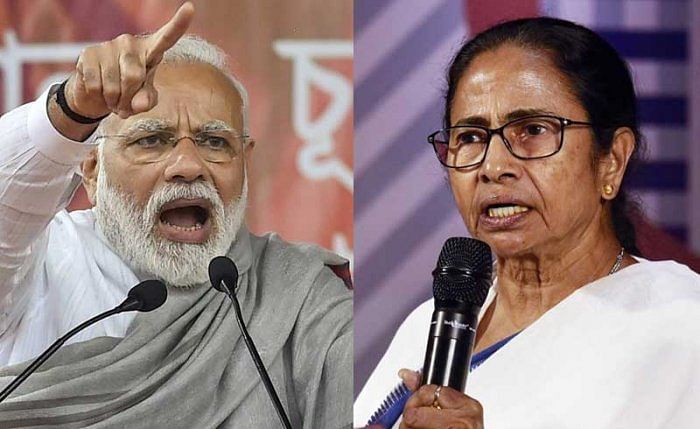
Adlai E Stevenson, during his 1952 Presidential campaign in the United States, said: “I offer my opponents a bargain: if they will stop telling lies about us, I will stop telling the truth about them.” Narendra Modi did not ask for such a bargain when Rahul Gandhi started calling him a ‘chor'. During the campaign, Modi too has come down vehemently on him, referring to his Bofors-accused father, Rajiv Gandhi, as “most corrupt”. But in Bengal, till a couple of months ago, Chief Minister Mamata Banerjee refrained from using the word 'chor' against her bête noire. The political campaign in the state was until then restricted to commonplace political abuses.
But the heat and dust of a harrowing seven-phase election in Bengal has gradually blow off everybody’s restraint. The first provocation came from Modi, who nicknamed the CM “speed breaker Didi”, who ran a party that only engaged in "tolabaazi" (extortion). The Bengal CM reacted by describing Modi as a "dangabaaz", who only knew how to kill people. But things took a turn for the worse when Modi further provoked her by disclosing that she sends him kurtas and sweets. Instantly, the shrewd TMC supremo deciphered the real intention behind his words: Dissuading her strongmen from fighting the BJP by sending a message of entente at the highest level. She immediately disparaged the statement claiming: “Henceforth I’ll send Modi sweets made of soil and I’ll put pebbles inside it, like cashew nuts and raisins in a laddoo, so that he breaks his teeth while trying to eat it.”
Modi too did not let the issue go easily. He responded by introducing a twist to the ladoo tale. Sweets made of Bengal’s soil, the land of Swami Vivekananda and other greats, would be a great blessing for him, he proclaimed at an election rally. He further added that he would be happy if Trinamool Congress (TMC) stopped attacking his party workers and instead sent him the stones. Shortly thereafter, unmindful of the desired restraint expected of a PM, at another rally he claimed that 40 MLAs of the TMC were in touch with him, ready to join the Bharatiya Janata Party (BJP).
It made Mamata Banerjee furious. So far she was the boss of Bengal. She had appropriated quite a few Left and Congress MLAs in the past. A few weeks before the notification of the election, prominent Congress MP Mausam Noor too had joined the TMC. But, initiating a reverse trend, two sitting MPs of her party had joined the BJP just before the polls. Mamata knew the PM was now trying to steal ‘the masculinity factor’ from her by threatening to break her party. She had two options before her: Either to play the victim card, or to display to the people that she was much stronger than the BJP.
Already under pressure, as talks of an undercurrent in favour of the BJP were being reported from constituencies where five years ago BJP got 15 per cent or less votes, she overstepped the line in response. First, she reacted vehemently to people chanting ‘Jai Shri Ram’ on seeing her during a roadshow. Amit Shah, the BJP president, immediately made it an issue. Meanwhile, Modi continued to be unrelenting in exhibiting his brand of masculine politics. Speaking at a meeting in Bengal’s tribal belt, he claimed the TMC would get less than 10 (out of 42) seats in Bengal.
Now shedding all hesitation, Mamata Banerjee decided to portray herself as stronger than Modi. On the same day, she claimed if it was any other state, people would have grabbed Modi by the neck and thrown him out. The following day she said in a meeting in the same tribal belt where the PM had earlier spoken: “When Modi comes to Bengal and dubs Trinamool as tolabaaz, what comes to mind is to give him a tight democratic slap.”
Nobody knows whether in the remaining ten days of campaign the bar will be lowered any further, and whether the heat will finally fire up the lower level workers. So far, this year’s poll campaign in Bengal has remained much less violent with just one death even after polling ended in 25 constituencies. In 2014, violence (on the poll day and 48 hours before and after polling) claimed seven lives. In 2009, the figure stood at 11. This year, not much major pre or post-poll violence has been reported so far. Whether the trend will continue, or the recklessness of the leaders will vitiate the atmosphere in last two phases, when 17 constituencies go to polls, is yet to be seen.
However, this ratcheting up of rancour between Mamata Banerjee and Narendra Modi raises the question how they will work together if the latter comes back as PM. After Cyclone Fani hit Bengal, Mamata said she had refused to answer the PM’s call as she no longer recognised him as the PM! It reveals that her exasperation has got the better of her political shrewdness. Her frayed nerves would, however, be soothed if she retains at least two-thirds of the seats (28). That would not be considered too major a loss for her party that bagged 34 seats in 2014. Perhaps that would ease much of the strain apparent at this moment. However, if her tally comes down to about half of the total seats or less, it will probably be a total war in Bengal.
(Diptendra Raychaudhuri is a Kolkata-based journalist and author of books including, A Naxal Story. He is a deputy editor at the Bengali daily, Aajkal)
Also read: Mamata responds to PM Modi’s gift claim